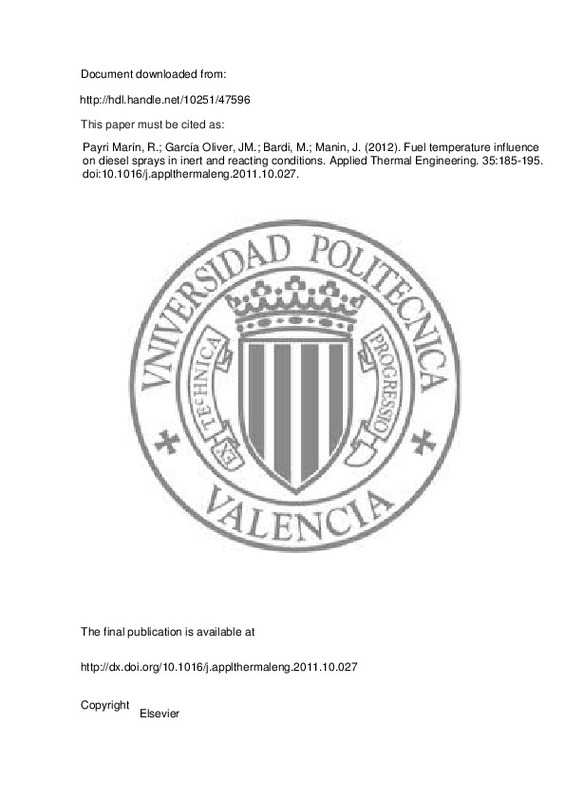JavaScript is disabled for your browser. Some features of this site may not work without it.
Buscar en RiuNet
Listar
Mi cuenta
Estadísticas
Ayuda RiuNet
Admin. UPV
Fuel temperature influence on diesel sprays in inert and reacting conditions
Mostrar el registro sencillo del ítem
Ficheros en el ítem
| dc.contributor.author | Payri Marín, Raúl
|
es_ES |
| dc.contributor.author | García Oliver, José María
|
es_ES |
| dc.contributor.author | Bardi, Michele
|
es_ES |
| dc.contributor.author | MANIN, JULIEN
|
es_ES |
| dc.date.accessioned | 2015-03-02T10:33:40Z | |
| dc.date.available | 2015-03-02T10:33:40Z | |
| dc.date.issued | 2012-03 | |
| dc.identifier.issn | 1359-4311 | |
| dc.identifier.uri | http://hdl.handle.net/10251/47596 | |
| dc.description.abstract | The detailed knowledge of the evaporationecombustion process of the Diesel spray is a key factor for the development of robust injection strategies able to reduce the pollutant emissions and keep or increase the combustion efficiency. In this work several typical measurement applied to the diesel spray diagnostic (liquid length, lift-off length and ignition delay) have been employed in a novel continuous flow test chamber that allows an accurate control on a wide range of thermodynamic test conditions (up to 1000 K and 15 MPa). A step forward in the control of the test boundary conditions has been done employing a special system to study the fuel temperature effect on the evaporation and combustion of the spray. The temperature of the injector body has been controlled with a thermostatic system and the relationship between injector body and fuel temperature has been observed experimentally. Imaging diagnostics have been employed to visualize the liquid phase penetration in evaporative/inert conditions and, lift-off length and ignition delay in reactive condition. The results underline a clear influence of the injector body temperature on both conditions, evaporative and, in a lesser degree, reactive; finally the physical models found in the literature have been compared with the results obtained experimentally | es_ES |
| dc.description.sponsorship | This research has been funded in the frame of the project FLEXIFUEL reference TRA2010-17564 from Ministerio de Ciencia e Innovacion. The injectors are part of the ECN international project. | en_EN |
| dc.language | Español | es_ES |
| dc.publisher | Elsevier | es_ES |
| dc.relation.ispartof | Applied Thermal Engineering | es_ES |
| dc.rights | Reserva de todos los derechos | es_ES |
| dc.subject | Diesel | es_ES |
| dc.subject | Sprays | es_ES |
| dc.subject | Combustion | es_ES |
| dc.subject | Liquid length | es_ES |
| dc.subject | LOL | es_ES |
| dc.subject.classification | MAQUINAS Y MOTORES TERMICOS | es_ES |
| dc.title | Fuel temperature influence on diesel sprays in inert and reacting conditions | es_ES |
| dc.type | Artículo | es_ES |
| dc.identifier.doi | 10.1016/j.applthermaleng.2011.10.027 | |
| dc.relation.projectID | info:eu-repo/grantAgreement/MICINN//TRA2010-17564/ES/ESTUDIO TEORICO EXPERIMENTAL DE LA INFLUENCIA DEL COMBUSTIBLE SOBRE LA CAVITACION Y EL DESARROLLO DEL CHORRO EVAPORATIVO/ | es_ES |
| dc.rights.accessRights | Abierto | es_ES |
| dc.contributor.affiliation | Universitat Politècnica de València. Departamento de Máquinas y Motores Térmicos - Departament de Màquines i Motors Tèrmics | es_ES |
| dc.contributor.affiliation | Universitat Politècnica de València. Instituto Universitario CMT-Motores Térmicos - Institut Universitari CMT-Motors Tèrmics | es_ES |
| dc.description.bibliographicCitation | Payri Marín, R.; García Oliver, JM.; Bardi, M.; Manin, J. (2012). Fuel temperature influence on diesel sprays in inert and reacting conditions. Applied Thermal Engineering. 35:185-195. https://doi.org/10.1016/j.applthermaleng.2011.10.027 | es_ES |
| dc.description.accrualMethod | S | es_ES |
| dc.relation.publisherversion | http://dx.doi.org/10.1016/j.applthermaleng.2011.10.027 | es_ES |
| dc.description.upvformatpinicio | 185 | es_ES |
| dc.description.upvformatpfin | 195 | es_ES |
| dc.type.version | info:eu-repo/semantics/publishedVersion | es_ES |
| dc.description.volume | 35 | es_ES |
| dc.relation.senia | 205991 | |
| dc.contributor.funder | Ministerio de Ciencia e Innovación | es_ES |







![[Cerrado]](/themes/UPV/images/candado.png)

